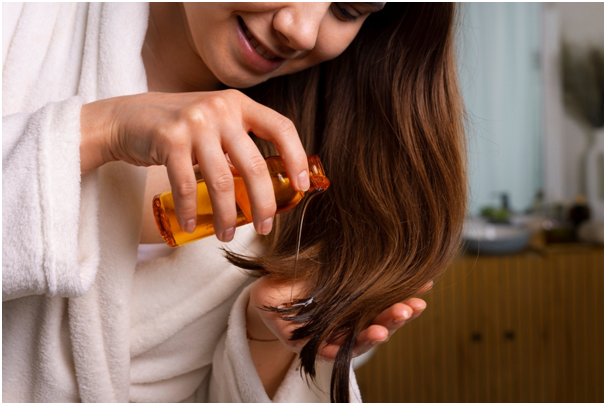Hair loss can be a distressing experience, affecting self-esteem and overall well-being. While genetics and hormonal factors play significant roles in hair health, vitamin deficiencies are often overlooked culprits that can lead to thinning hair or hair loss. Understanding the connection between hair vitamins and hair loss is essential for anyone seeking to maintain healthy hair. Explore the science behind hair vitamins and their impact on hair care and uncover practical tips to keep your hair strong, shiny, and full of life. From biotin to iron, a deficiency in these nutrients might be causing your hair loss. Discover how to restore your hair’s natural strength and beauty by adding these essential vitamins to your daily routine. In this article, we will explore how hair vitamin deficiencies can impact hair growth, which vitamins are crucial for hair health, and how to ensure you’re getting enough of these vital nutrients.
The Importance of Vitamins for Hair Health
Vitamins play critical roles in various bodily functions, including those directly related to hair health. Hair follicles are living structures that require a constant supply of nutrients to grow and thrive. A deficiency in essential hair vitamins can disrupt the hair growth cycle, leading to weaker hair strands and, ultimately, hair loss. Here’s a closer look at some key vitamins that are vital for maintaining healthy hair:
1. Biotin (Vitamin B7)
Biotin is perhaps the most well-known hair vitamin associated with hair health. It plays a crucial role in keratin production, a protein that forms the structure of hair.
Benefits of Biotin:
- Promotes hair growth and thickness.
- Improves the overall strength and elasticity of hair.
- Supports the health of hair follicles.
Sources of Biotin:
- Eggs
- Nuts and seeds
- Sweet potatoes
- Spinach
2. Vitamin A
Vitamin A is essential for cell growth and the maintenance of healthy skin, including the scalp. It helps produce sebum, an oily substance that moisturizes the scalp, preventing dryness and promoting a healthy environment for hair growth.
Benefits of Vitamin A:
- Stimulates hair growth by supporting the health of hair follicles.
- Prevents dry scalp, which can lead to hair breakage.
Sources of Vitamin A:
- Carrots
- Spinach
- Sweet potatoes
- Kale
3. Vitamin C
Vitamin C is a powerful antioxidant that helps protect hair follicles from oxidative stress caused by free radicals. It also plays a vital role in collagen production, which is essential for maintaining hair structure.
Benefits of Vitamin C:
- Supports collagen production, promoting stronger hair.
- Enhances the absorption of iron, which is crucial for hair health.
Sources of Vitamin C:
- Citrus fruits (oranges, lemons)
- Strawberries
- Kiwi
- Bell peppers
4. Vitamin D
Vitamin D is essential for the creation of new hair follicles. A deficiency in this vitamin has been linked to hair loss, particularly in women.
Benefits of Vitamin D:
- Stimulates new hair follicle growth.
- Regulates the hair growth cycle.
Sources of Vitamin D:
- Fatty fish (salmon, mackerel)
- Fortified foods (milk, cereals)
- Sunlight exposure
5. Vitamin E
Vitamin E is another potent antioxidant that can help prevent oxidative stress in hair follicles. It also improves blood circulation to the scalp, promoting hair growth.
Benefits of Vitamin E:
- Protects hair from oxidative damage.
- Enhances blood circulation to the scalp, supporting hair health.
Sources of Vitamin E:
- Nuts (almonds, hazelnuts)
- Seeds
- Spinach
- Avocado
6. Folic Acid (Vitamin B9)
Folic acid is crucial for the production of red blood cells, which transport oxygen to hair follicles. Adequate oxygen supply is necessary for hair growth.
Benefits of Folic Acid:
- Promotes healthy cell division and growth.
- Supports the overall health of hair follicles.
Sources of Folic Acid:
- Leafy greens (spinach, kale)
- Beans
- Lentils
- Fortified cereals
7. Iron
While not a vitamin, iron is an essential mineral that plays a crucial role in hair health. It helps carry oxygen to hair follicles, and a deficiency can lead to hair loss, especially in women.
Benefits of Iron:
- Supports oxygen transport to hair follicles.
- Prevents hair loss due to iron deficiency anemia.
Sources of Iron:
- Red meat
- Spinach
- Lentils
- Fortified cereals
How Hair Vitamin Deficiencies Lead to Hair Loss
When the body is deprived of essential hair vitamins, it prioritizes critical functions over hair growth. Hair is not vital for survival, so when nutrient levels drop, the body may divert resources away from hair production. Here’s how vitamin deficiencies can specifically contribute to hair loss:
1. Impaired Hair Follicle Function
Hair Vitamins like biotin, vitamin A, and vitamin D are essential for maintaining healthy hair follicles. Deficiencies can impair follicle function, leading to hair thinning and loss.
2. Disrupted Hair Growth Cycle
A lack of essential hair vitamins can disrupt the hair growth cycle, shortening the anagen (growth) phase and prolonging the telogen (resting) phase. This can result in increased hair shedding and slower regrowth.
3. Increased Hair Breakage
Vitamin deficiencies can weaken hair strands, making them more susceptible to breakage. This can create the appearance of thinning hair, even if overall density remains unchanged.
Signs of Hair Vitamin Deficiency
If you’re experiencing hair loss or thinning, it may be a sign of hair vitamin deficiency. Here are some symptoms to watch for:
- Hair Thinning: Noticeable loss of hair density or increased shedding.
- Dry and Brittle Hair: Hair feels dry, brittle, or lacks elasticity.
- Dull Appearance: Lack of shine or luster in your hair.
- Scalp Issues: Dry, flaky, or itchy scalp.
If you notice these symptoms, consider consulting with a healthcare professional to assess your nutrient levels and identify any deficiencies.
How to Ensure You’re Getting Enough Hair Vitamins
1. Balanced Diet
Eating a well-rounded diet rich in fruits, vegetables, lean proteins, and healthy fats is crucial for getting the vitamins and minerals necessary for hair health. Consider incorporating foods that are high in the essential vitamins mentioned above.
2. Hair Supplements
If you’re struggling to get enough nutrients from your diet alone, hair supplements can provide an easy way to ensure you’re getting the hair vitamins you need. Look for high-quality supplements that contain a blend of hair vitamins, including biotin, folic acid, and other key nutrients.
For example, Nano Singapore HS&N Multivitamin Complex contains a powerful combination of biotin, amino acids, and other essential nutrients designed to support healthy hair growth.
3. Regular Check-ups
Regular health check-ups can help identify any potential vitamin deficiencies early on. Blood tests can measure levels of essential nutrients, allowing you to take corrective action before hair loss occurs.
4. Stay Hydrated
Drinking enough water is vital for overall health, including hair health. Aim for at least eight glasses of water a day to keep your body hydrated.
Conclusion
Vitamin deficiencies can significantly impact hair health, leading to hair loss and thinning. By understanding the essential vitamins needed for healthy hair, you can take proactive steps to prevent deficiencies and support hair growth. Incorporating a balanced diet, considering hair supplements, and staying hydrated can make a significant difference in achieving the vibrant, thick hair you desire. If you’re concerned about hair loss or deficiencies, consult with a healthcare professional for personalized guidance and support.


